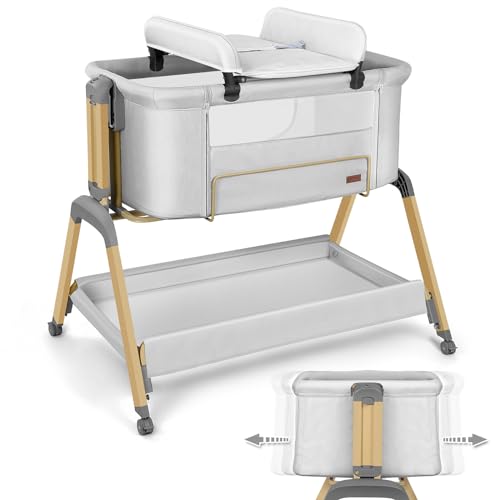The People Nearest To Bedside Cot For Baby's Room Share Some Big Secrets
The Ultimate Guide to Choosing a Bedside Cot for Your Baby's Room
As new parents prepare to invite their little ones, among the most important issues is developing a safe and comfortable sleeping environment. A bedside cot is a significantly popular choice, providing benefit and assurance. This article checks out the advantages of bedside cots, essential features to consider, their benefits over standard cots, and answers to often asked questions.
What is a Bedside Cot?
A bedside cot, likewise referred to as a co-sleeper or side-sleeper cot, is developed to connect firmly to the side of the moms and dad's bed. This innovative sleeping option permits easy ease of access, making it possible for parents to tend to their baby's requirements without the requirement to leave their own sleeping space. This benefit cultivates a bonding experience, as parents can easily reach their baby for feedings and convenience throughout the night.
Benefits of Using a Bedside Cot
Bedside cots offer many advantages that standard cribs may not provide. Here are some crucial benefits:
- Convenience: Bedside cots allow parents to be close to their baby without compromising space or security.
- Safety: Many bedside cots meet security requirements and design functions to ensure the baby can not present onto the flooring.
- Breastfeeding Friendly: Mothers can quickly breastfeed during the night without requiring to get out of bed.
- Easier Sleep Training: Bedside cots can make sleep training easier as babies feel protected being close to their parents.
Key Features to Consider When Choosing a Bedside Cot
When picking the ideal bedside cot for your baby's room, keep in mind the following vital features:
1. Safety Standards
- Ensure the cot satisfies regional security regulations and requirements. Look for a cot that has breathable mesh sides for much better ventilation.
2. Height Adjustment
- Search for a cot with adjustable heights to fit your bed's level, enabling for a protected fit and reducing the threat of spaces.
3. Stability
- Ensure the cot has a tough frame to avoid tipping. Stability is crucial for security.
4. Portability
- If travel is expected, consider a light-weight model that can quickly fold or take apart.
5. Convertible Features
- Some cots can transform to a bassinet or playpen, allowing for extended use beyond infancy.
6. Bed mattress Quality
- Look for a firm, effectively fitted bed mattress that fulfills security requirements to support the infant's fragile body.
7. Ease of Assembly
- A cot that is easy to put together and disassemble can save time and disappointment, especially for new parents.
8. Rate Range
- Budget plans can vary; identify upfront how much you are ready to invest in a bedside cot.
Contrasts: Bedside Cot vs. Traditional Cot
Feature
Bedside Cot
Traditional Cot
Availability
Easy access from bed
Requires complete motion to reach baby
Co-sleeping Functionality
Designed for co-sleeping
Not suitable for co-sleeping
Size
Generally smaller for space efficiency
Standard crib size
Portability
Typically more portable
Heavier and less portable
Connection with Parent
Directly connected to the parent's bed
Freestanding, requiring range
Flexibility
Can transform and adjust to numerous stages
Mainly for setting infant down
Often Asked Questions (FAQs)
1. Are bedside cots safe for newborns?
Yes, if appropriately established according to safety guidelines and connected securely to the parent's bed, bedside cots are safe for newborns.
2. Can a bedside cot avoid SIDS (Sudden Infant Death Syndrome)?
While no cot can guarantee prevention of SIDS, utilizing a bedside cot encourages safe sleep practices, allowing parents to monitor their baby closely.
3. The length of time can a baby use a bedside cot?
Normally, babies can use a bedside cot from birth up to around six months old, depending upon the specific weight and height limitations set by the maker.
4. Do bedside cots come with a mattress?
Most bedside cots consist of a mattress; nevertheless, it's important to examine that it adheres to safety standards and fits well within the cot to avoid spaces.
5. Can you use a bedside cot with a bed that has a high frame?
Yes, many bedside cots feature adjustable heights to accommodate various bed heights. Constantly measure Bedside Crib For Attachment Parenting to guarantee a proper fit.
6. What is the best material for a bedside cot?
Look for natural materials such as strong wood or organic materials that are free from harmful chemicals, guaranteeing a safe environment for your baby.
A bedside cot can considerably improve the experience of new parents, offering the availability and safety needed during the newborn stage. With cautious factor to consider of the features outlined above, parents can choose a bedside cot that finest matches their family's needs. By investing in a quality bedside cot, parents can enjoy more peaceful nights, understanding their baby is close by, protect, and comfortable.
Secret Takeaways
- Bedside cots offer convenience, safety, and comfort for both moms and dad and baby.
- Important functions to consider consist of security requirements, stability, and size.
- Always ensure you choose a cot that satisfies safety guidelines and suits your lifestyle.
Creating a supporting environment for a baby does not end with the cot option however begins there, offering comfort and security for a restful night's sleep.
